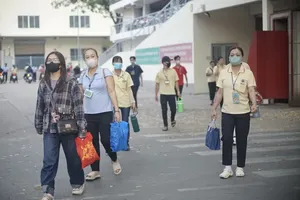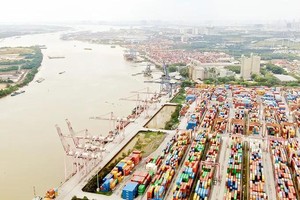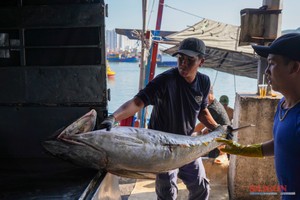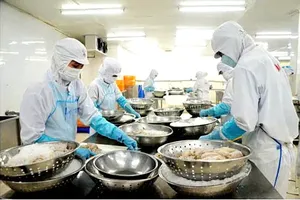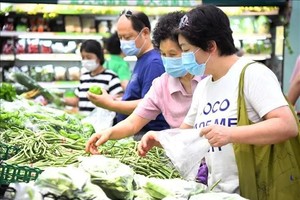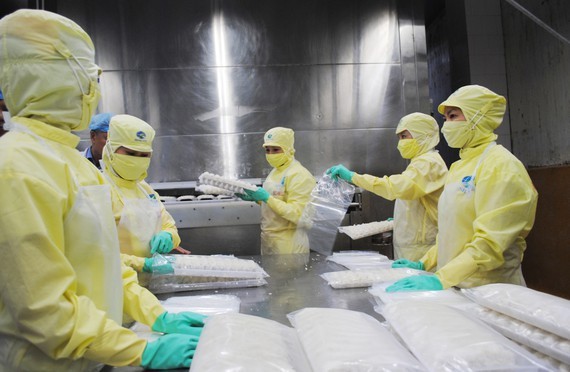 Processing shrimp for export in Ca Mau Province. (Photo: SGGP)
Processing shrimp for export in Ca Mau Province. (Photo: SGGP)
Providing accommodations for workers at hotels
Ca Mau City of Ca Mau Province is the place where shrimp processing enterprises gather most in the Mekong Delta. Mr. Nguyen Thanh Phuong, Head of Economic Department of Ca Mau City, said that 14 enterprises had registered to carry out three-on-site production with more than 6,000 workers. Enterprises with a large number of workers must rent accommodations in many places to meet the demand. Specifically, Minh Phu Seafood Group Joint Stock Company had more than 1,950 workers registered to participate in three-on-site production. Therefore, this enterprise rented six hotels and kindergartens in Ca Mau City, including the five-star Muong Thanh Ca Mau Hotel, for workers to stay.
Similarly, Ca Mau Seafood Processing and Services Company rented Song Hung Hotel and some other hotels to arrange accommodation for 600 workers. Ca Mau Seafood Processing and Import-Export Joint Stock Company leased Sao Kim and A Dong 2 hotels to accommodate many workers. Besides, enterprises also provided meal allowance for three meals every day for workers. Some enterprises gave a financial aid of VND50,000 per day per person.
In Bac Lieu Province, Mr. Phan Van Sau, Director of the Department of Industry and Trade of this province, said that due to the labor-intensive characteristic of seafood processing enterprises, it is difficult to deploy a live-in at the factory for workers. However, amid the context that the Covid-19 pandemic in Bac Lieu Province is controlled quite well, to create favorable conditions for businesses to operate, the province requires them to rearrange production and ensure pandemic prevention measures. Enterprises must reduce the number of workers, with a shift not higher than 300 workers. At the same time, they must closely coordinate with local authorities in managing workers. "However, if the Covid-19 pandemic becomes more intense, the authorities will consider suspending operations of enterprises that have not ensured safety," said Mr. Phan Van Sau.
Increasing processing for export
According to the Department of Agriculture and Rural Development of the Mekong Delta provinces, raw shrimp prices had fluctuated heavily during social distancing to prevent the pandemic. Specifically, in mid-July, the prices of white-leg shrimp increased by VND1,000-VND8,000 per kilogram, depending on the type, whereas black tiger shrimp prices remained stable. However, when Mekong Delta provinces continued to prolong social distancing from the beginning of August, shrimp prices declined again. Black tiger shrimp sized-20 pcs per kilogram fetched VND210,000 per kg; white-leg shrimp sized-30 pcs per kg was sold at VND131,000 per kg, and sized 100 pcs per kg at VND77,000 per kg, down from VND5,000 to VND10,000 per kg depending on the type.
The director of a shrimp processing enterprise for export in Soc Trang Province analyzed that due to difficulties in traveling during social distancing, the harvest, trade, and transport of shrimp have been affected. In addition, shrimp processing factories have also cut the number of workers and reduced processing capacity, while many containers are being congested at ports and checkpoints, thereby affecting raw shrimp consumption.
Although the prices of raw shrimp are volatile, shrimp exports remain positive. According to the Ministry of Agriculture and Rural Development, in July, enterprises exported 50,000 tons of shrimp, worth US$470 million, up 19 percent in volume and 22 percent in value over the same period last year. Generally, in the first seven months of this year, shrimp exports are estimated at 240,000 tons, with a value of $2.19 billion, up 15.5 percent in volume and 16 percent in value compared to the same period last year. Vietnam's shrimp exports to markets, namely the US, Japan, the EU, the UK, and Australia, posted good growth, whereas shrimp exports to the Chinese market dropped. The Korean market alone saw a slight decrease in volume but an increase in value over the same period.
The Industry and Trade Information Center under the Ministry of Industry and Trade assesses that the global demand for shrimp imports tends to increase, especially in large and traditional markets. Meanwhile, shrimp supply from some countries, such as India, Indonesia, and other suppliers, will decrease due to the negative impact of the Covid-19 pandemic. Thereby, it is forecasted that Vietnam's shrimp exports in the upcoming months will still achieve good growth results, thanks to many advantages from the FTAs and stability in farming.
According to the departments of Industry and Trade of provinces in the Mekong Delta, shrimp exports in the last months of this year are expected to be positive because the orders signed by exporting enterprises remain plentiful. However, the current difficulties include the increasing freight rates and the shortage of containers and shipping vessels. At the same time, many issues still depend on the developments of the Covid-19 pandemic.
Ca Mau City of Ca Mau Province is the place where shrimp processing enterprises gather most in the Mekong Delta. Mr. Nguyen Thanh Phuong, Head of Economic Department of Ca Mau City, said that 14 enterprises had registered to carry out three-on-site production with more than 6,000 workers. Enterprises with a large number of workers must rent accommodations in many places to meet the demand. Specifically, Minh Phu Seafood Group Joint Stock Company had more than 1,950 workers registered to participate in three-on-site production. Therefore, this enterprise rented six hotels and kindergartens in Ca Mau City, including the five-star Muong Thanh Ca Mau Hotel, for workers to stay.
Similarly, Ca Mau Seafood Processing and Services Company rented Song Hung Hotel and some other hotels to arrange accommodation for 600 workers. Ca Mau Seafood Processing and Import-Export Joint Stock Company leased Sao Kim and A Dong 2 hotels to accommodate many workers. Besides, enterprises also provided meal allowance for three meals every day for workers. Some enterprises gave a financial aid of VND50,000 per day per person.
In Bac Lieu Province, Mr. Phan Van Sau, Director of the Department of Industry and Trade of this province, said that due to the labor-intensive characteristic of seafood processing enterprises, it is difficult to deploy a live-in at the factory for workers. However, amid the context that the Covid-19 pandemic in Bac Lieu Province is controlled quite well, to create favorable conditions for businesses to operate, the province requires them to rearrange production and ensure pandemic prevention measures. Enterprises must reduce the number of workers, with a shift not higher than 300 workers. At the same time, they must closely coordinate with local authorities in managing workers. "However, if the Covid-19 pandemic becomes more intense, the authorities will consider suspending operations of enterprises that have not ensured safety," said Mr. Phan Van Sau.
Increasing processing for export
According to the Department of Agriculture and Rural Development of the Mekong Delta provinces, raw shrimp prices had fluctuated heavily during social distancing to prevent the pandemic. Specifically, in mid-July, the prices of white-leg shrimp increased by VND1,000-VND8,000 per kilogram, depending on the type, whereas black tiger shrimp prices remained stable. However, when Mekong Delta provinces continued to prolong social distancing from the beginning of August, shrimp prices declined again. Black tiger shrimp sized-20 pcs per kilogram fetched VND210,000 per kg; white-leg shrimp sized-30 pcs per kg was sold at VND131,000 per kg, and sized 100 pcs per kg at VND77,000 per kg, down from VND5,000 to VND10,000 per kg depending on the type.
The director of a shrimp processing enterprise for export in Soc Trang Province analyzed that due to difficulties in traveling during social distancing, the harvest, trade, and transport of shrimp have been affected. In addition, shrimp processing factories have also cut the number of workers and reduced processing capacity, while many containers are being congested at ports and checkpoints, thereby affecting raw shrimp consumption.
Although the prices of raw shrimp are volatile, shrimp exports remain positive. According to the Ministry of Agriculture and Rural Development, in July, enterprises exported 50,000 tons of shrimp, worth US$470 million, up 19 percent in volume and 22 percent in value over the same period last year. Generally, in the first seven months of this year, shrimp exports are estimated at 240,000 tons, with a value of $2.19 billion, up 15.5 percent in volume and 16 percent in value compared to the same period last year. Vietnam's shrimp exports to markets, namely the US, Japan, the EU, the UK, and Australia, posted good growth, whereas shrimp exports to the Chinese market dropped. The Korean market alone saw a slight decrease in volume but an increase in value over the same period.
The Industry and Trade Information Center under the Ministry of Industry and Trade assesses that the global demand for shrimp imports tends to increase, especially in large and traditional markets. Meanwhile, shrimp supply from some countries, such as India, Indonesia, and other suppliers, will decrease due to the negative impact of the Covid-19 pandemic. Thereby, it is forecasted that Vietnam's shrimp exports in the upcoming months will still achieve good growth results, thanks to many advantages from the FTAs and stability in farming.
According to the departments of Industry and Trade of provinces in the Mekong Delta, shrimp exports in the last months of this year are expected to be positive because the orders signed by exporting enterprises remain plentiful. However, the current difficulties include the increasing freight rates and the shortage of containers and shipping vessels. At the same time, many issues still depend on the developments of the Covid-19 pandemic.
Despite the obstacles, the path for Mekong Delta shrimp remains fairly wide because Vietnam's shrimp exports usually increase sharply from the middle of the third quarter to the fourth quarter. This is an opportunity for seafood enterprises to expand their market share. The current problem is that the coastal provinces of the Mekong Delta have solutions to expand the safe zone to increase shrimp farming areas; more factories carry out three-on-site production; creating favorable conditions in harvesting, trading, and transporting shrimp from farms to factories faster, while still ensuring the regulations on pandemic prevention. With that, enterprises will be able to promote shrimp consumption for farmers, thereby increasing the processing and striving to fulfill the shrimp export target of $3.8 billion-$4 billion this year.
